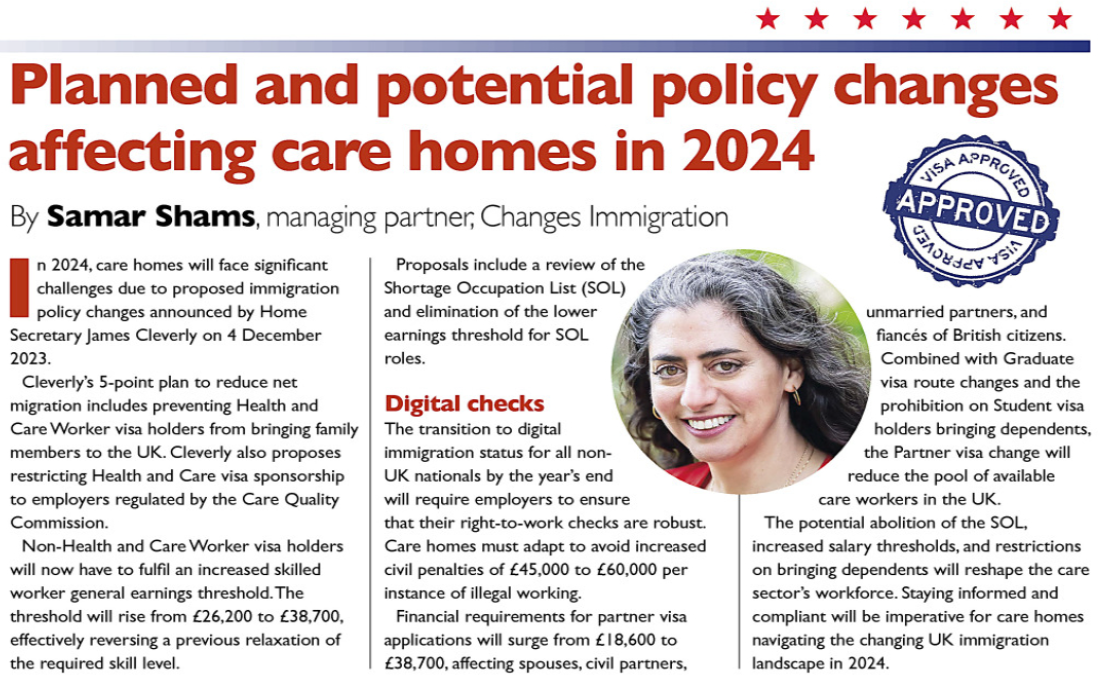New Immigration Rules and Home Office guidance relating to sponsorship of Skilled Workers and Global Business Mobility Senior or Specialist Workers were introduced in April 2023.
Managing Partner Samar Shams rounds up the most significant changes here.
Sponsored Workers
An increase in the ‘going rate’ salary for most roles is compounded by a decrease in the weekly hours on which the going rates for most roles eligible for sponsorship are based. The weekly hours on which going rates are based is changing from a 39-hour week to a 37.5-hour week. The overall effect is higher going rate salary requirements.
General salary thresholds increases
Skilled Worker
| Salary at least going rate | Relevant PhD and salary at least 90% of going rate | Relevant STEM PhD and salary at least 80% of going rate | Shortage Occupation List role | ‘New Entrant’ worker, e.g. aged < 26, Student or Graduate | |
| New general salary threshold | £26,200 | £23,580 | £20,960 | £20,960 | £20,960 |
The hourly salary threshold has increased to £10.75.
Global Business Mobility
The Senior or Specialist Worker and UK Expansion Worker general salary threshold has increased to £45,800.
Other sponsored worker changes
The new rules specify that sponsors must comply with Working Time Regulations as well as National Minimum Wage Regulations.
Absences are permitted for jury service or attending court as a witness.
A concession is introduced for averaging pay to accommodate irregular working patterns where sponsored workers will be working different hours each week, resulting in uneven pay.
Reporting home working
Sponsors must report if a worker is, or will be, working remotely from home on a permanent or full-time basis or has moved to a hybrid working pattern, i.e. where the worker will work remotely on a regular and planned basis from their home. The report must be made within 10 days of the change.
Opting out of Working Time Regulations
Where a sponsored worker will be working more than 48 hours per week, UK Visas and Immigration (UKVI) caseworkers are instructed to request a Working Time Regulations opt-out agreement signed by the sponsored worker. We recommend that sponsors have Working Time Regulations opt-out agreements in place before a worker submits their application for immigration permission. Where application processes allow for submission of supporting documents, the worker should submit the finalised Working Time Regulations opt-out agreement in support of their application for immigration permission. Otherwise, the worker should be ready for UKVI to request the opt-out agreement when deciding their application.
In our experience, caseworkers have not yet adopted this change.
Compelling circumstances for absences
The guidance has changed on terminating sponsorship if a worker is absent from work without pay, or is on reduced pay, for more than 4 weeks in total. The general requirement to terminate sponsorship is now tempered not only with the list of acceptable reasons for such absences, but also with an allowance for ‘compelling reasons’ to continue sponsoring the worker. If a sponsor believes there are compelling reasons to continue sponsoring the worker, they must report the period of absence (including reasons, duration and any changes to salary) via the Sponsorship Management System. UKVI will consider the reasons given; they may still cancel the worker’s permission if they are not satisfied there is a compelling reason for continuing to sponsor the worker.
‘Supernumerary’
Sponsors who host non-UK national interns under the Intern Visa Scheme will be familiar with the requirement that an eligible internship be ‘supernumerary’, i.e. over and above the employer’s normal staffing requirement. Guidance on the term ‘supernumerary’ has changed. Caseworkers are instructed that the following may indicate that a role is not supernumerary:
- A salary high enough to meet the salary requirements on another sponsored work route; or
- Working hours exceeding 37 hours per week.
Reporting a change in size
The time period for a sponsor to report a change in the size of their organisation is amended from 10 working days to 20 working days.
Immigration enforcement
In addition to the specific breaches of sponsor duties for which UKVI may revoke a sponsor licence, UKVI will now normally revoke a sponsor licence if they ‘have reason to believe that [a sponsor] otherwise pose[s] any risk to immigration control’. Against the backdrop of a recent flurry of immigration enforcement activity, the new, catch-all reason for revoking a sponsor licence strikes an ominous note.
Workers’ relationships with their partners will be assessed differently
From 25 July 2023, the Home Office will assess the relationships of work visa holders with partners applying for leave as dependants under different criteria. More on this point in due course . . .
Publication Date: 26 May 2023








